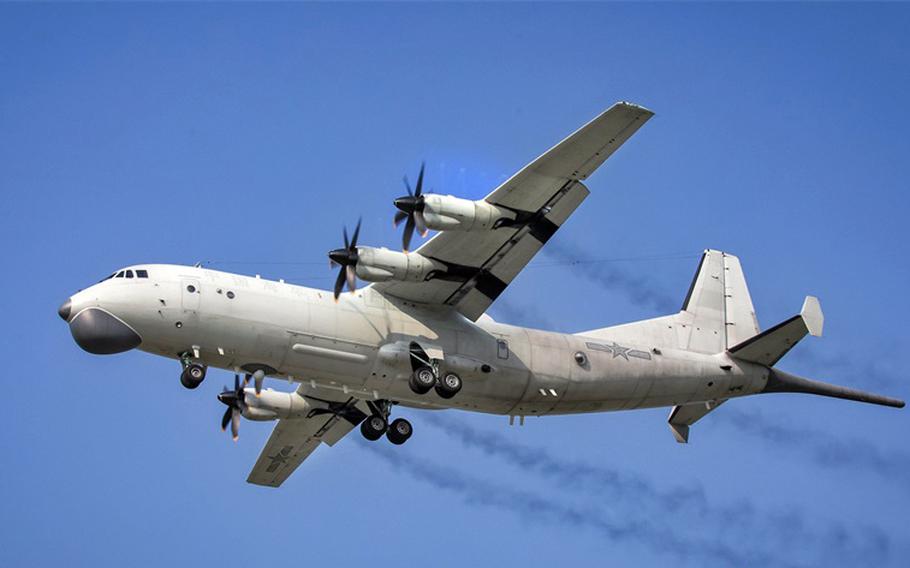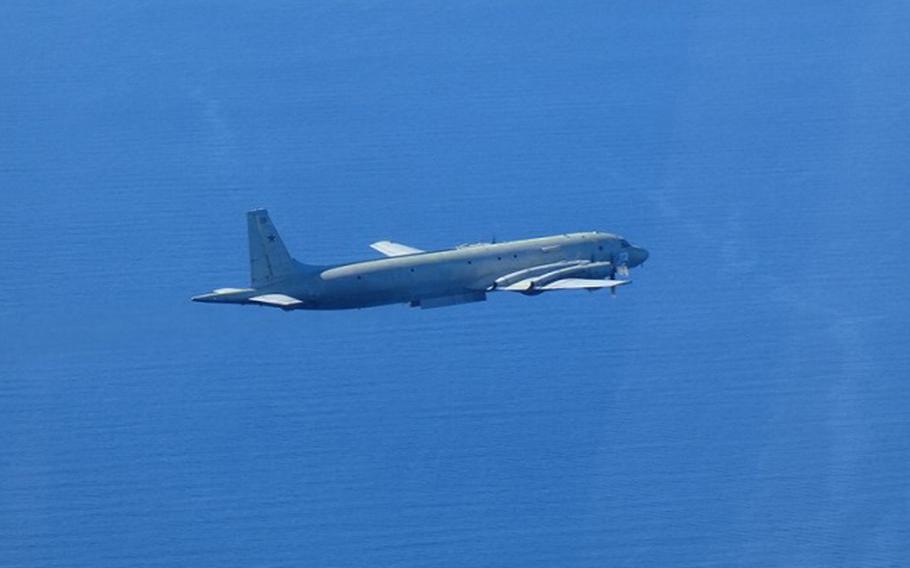
A Chinese anti-submarine patrol aircraft takes off for training on Aug. 15, 2024. (China Military Online)
TOKYO — Recent incursions into its airspace and territorial waters by China and Russia has left Japan feeling vulnerable, its defense minister said this week.
A Russian IL-38 reconnaissance aircraft entered Japanese airspace three times on Monday, prompting Tokyo to scramble fighter jets to intercept and ultimately warn off the aircraft with flares. It was the latest in a series of incursions that began with a Chinese Y-9 surveillance aircraft’s brief entry into Japanese airspace on Aug. 26.
Five days later, a Chinese survey vessel entered Japan’s territorial waters near Kagoshima prefecture. On Sept. 6, four Chinese coast guard vessels crossed the 12-mile territorial limit claimed by Japan around the Senkaku Islands.
“The Ministry of Defense and the Self-Defense Forces feel a strong sense of danger that such incidents have occurred one after another in a short period of time in waters and airspace surrounding Japan,” Defense Minister Minoru Kihara said at a news conference Tuesday.

This Russian IL-38 patrol aircraft entered Japanese territory three times on Sept. 23, 2024, according to Japan's Ministry of Defense. (Japan's Ministry of Defense)
He also expressed concern over a transit by the Chinese aircraft carrier Liaoning and two destroyers between the Japanese islands of Yonaguni and Iriomote into the country’s contiguous zone on Sept. 18.
The zone extends 12 miles beyond territorial waters and allows countries to prevent illegal actions or enforce laws broken within its territory, according to the National Oceanic and Atmospheric Administration.
“In any event, the Ministry of Defense and the Self-Defense Forces are determined to resolutely protect Japan’s territory, territorial waters and airspace, and will continue to monitor with strong interest military movements by Russia and China in waters and airspace surrounding Japan,” Kihara said.
A pair of Russian Tu-124 patrol aircraft also circled Japan’s four main islands — the first such patrol in five years — flying from Okinawa in the south to Hokkaido in the north, Japan’s Joint Staff said in a Sept. 13 statement. They did not cross into Japanese airspace, but did fly over northern territories that are disputed between Tokyo and Moscow.
Kihara in separate news conferences on Monday and Friday said Japan has lodged “strong protests” and “serious concerns” over the incidents through diplomatic channels.
He also speculated Monday that the Russian aircraft’s incursion could be related to a joint exercise between China and Russia that’s taking place in the Sea of Japan and Sea of Okhotsk.
A joint fleet of Chinese and Russian ships entered the Sea of Okhotsk, separated from the Sea of Japan by Russia’s Sakhalin Island and Japan’s northernmost island of Hokkaido, as part of exercise Beibu/Interaction 2024, the Russian Defense Ministry said in a news release Tuesday.
Russian ships include the destroyers Admiral Panteleyev and Admiral Tributs, corvettes MPK-82 and MPK-107, and the monitor Smerch. Chinese ships include the destroyers Xining and Wuxi, the frigate Lin Yi and supply ship Taihu, according to the ministry.
While the exercises aren’t necessarily intended as warnings or messages to Tokyo, they are worrisome, said Greg Poling, a senior fellow at the Center for Strategic International Studies.
“The exercises in the Sea of Okhotsk and Sea of Japan are a sign of the growing security cooperation between Russia and China,” Poling, who directs the CSIS Southeast Asia Program, told Stars and Stripes by email Wednesday. “That is worrying on a lot of fronts, including for Japan which has territorial and maritime disputes with both.”
Russia’s repeated violations of Japanese airspace are “emblematic of the recklessness and disregard for international law in which Moscow seems to revel these days,” he wrote.